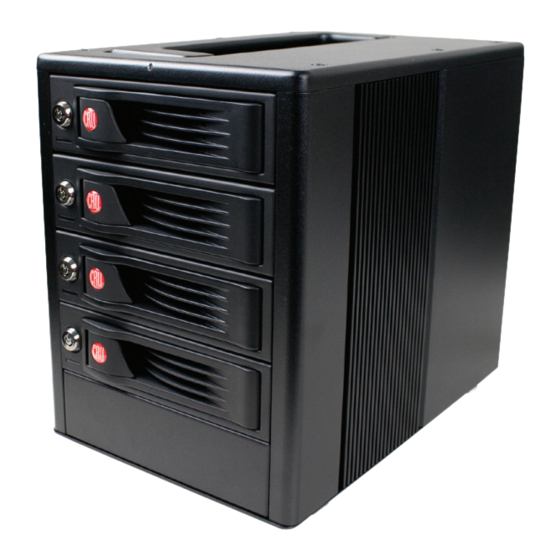CRU Dataport RTX410-3QJ Podręcznik użytkownika - Strona 7
Przeglądaj online lub pobierz pdf Podręcznik użytkownika dla Przechowywanie CRU Dataport RTX410-3QJ. CRU Dataport RTX410-3QJ 8 stron. 4-bay hard drive array
Również dla CRU Dataport RTX410-3QJ: Skrócona instrukcja obsługi (2 strony)

CRU
Q: Why is my hard drive experiencing data corruption?
A: Many things can cause data corruption on hard drives, whether they are inside your computer or inside
an external storage product. Malicious software, OS bugs, failure to properly disconnect external devices,
or no reason at all. Data corruption or loss is therefore not covered by warranty (this is the case with all
rational companies in the storage industry).
The first thing to try is restarting both the computer and the external device. If the data is still corrupted,
try running built-in OS utilities (such as Mac OS X's Disk Utility First Aid) on the hard drive. For best
results, boot your computer with a Mac OS X Installation CD, and launch Disk Utility from the CD. When
you reach the Mac OS Installation program, you can run Disk Utility from one of the menus at the top of
the screen. From Disk Utility, you can run "Verify Disk" and "Repair Disk" to find and fix any errors that
may be present in your Mac OS installation.
If the OS utility doesn't help, you may need Data Rescue. This is a great solution for recovering lost data
from a hard drive which has suffered data loss or corruption. If there is a true hardware failure of your
hard drive that prevents it from communicating with your computer, there is no software solution in
existence that can fix this problem. However, since we cannot tell you with any certainty whether or not
you are experiencing hardware failure in your particular hard drive, we would encourage you to download
a free demo version of ProSoft's Data Rescue from www.prosofteng.com. It is limited, in that it only allows
you to recover one file per session, but it will tell you if it even sees any files.
Q: I just connected my eSATA product to my computer for the first time. I turned on the power, but the
drive did not spin up. Is the drive dead?
A: SATA drives will not power up if a SATA cable is plugged into them, but no valid connection is
established with a host. To test this, unplug the SATA cable, but leave the power plugged in. If the drive
spins up in this configuration, then the problem can be attributed to the SATA host (i.e. eSATA host card).
Q: Can I hot-swap drives with this product?
A: Only if the eSATA/SATA host supports this feature. All eSATA host cards currently sold by CRU-
WiebeTech support hot swapping. Third-party host cards may or may not support this feature.
Q: It is possible to boot to the external drive(s) in this product?
A: Only if that feature is supported by the eSATA host to which you are connecting. Many eSATA hosts
do not support booting. If this feature is important to you, you should read the technical specifications of
any host card you're considering to make sure it supports booting.
Q: Why won't the computer let me eject or unmount my drive?
A: There may be a software application running in the background with an active link to the drive.
Sometimes, you may see a message such as "The disk is in use and could not be ejected. Try quitting
applications and try again."
It could be a background application like Sherlock or the Finder. This is not a defect or issue caused by
the WiebeTech device. Try invoking the Force Quit feature in OS X to see what software may be running.
For Windows XP, the equivalent command is CTRL-ALT-DEL.
Drives connected to the computer via eSATA cannot be ejected in Windows the way FireWire drives can.
However, freeware utilities are available on the internet that provide a similar function.
Q: Can I access drives formatted NTFS on my Mac?
A: Mac OS 10.3 or higher allows drives formatted in NTFS to mount and be seen as read-only volumes.
Data may not be written to the drives, but it may be copied from the drives.
R T X 4 - b a y U s e r M a n u a l A 9 - 4 0 0 - 0 0 0 7 R E V 1 . 0
- 7 -
